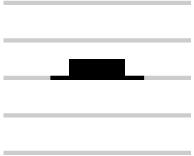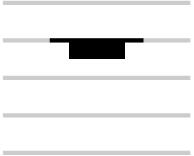duration:
- half note (oral prompt: “ta-ah”),


half rest,

(usually means silence for 2 beats)
whole note (oral prompt: “ta-ah-ah-ah”),

whole rest

(usually means silence for 4 beats)
pitch:
- high “do”, simple melodic ostinato, melodic patterns, melodic patterns using notes of a pentatonic scale (e.g., “do–re–mi–so–la”, “do–re–fa–so–la”)
dynamics and other expressive controls:
- gradations in volume encountered in music listened to, sung, and played (e.g., getting louder [crescendo], getting softer [decrescendo/diminuendo])
- articulation (e.g., smooth [legato], detached [staccato])
timbre (also known as tone colour):
- classification of instruments by listening to their sound (e.g., wind [woodwind, brass], stringed, electronic, membrane, pitched percussion instruments)
texture/harmony:
- single melodic line in unison song with simple accompaniment (homophony), bordun patterns on “do” and “so”
form:
- phrase, binary (AB) form, simple verse and chorus